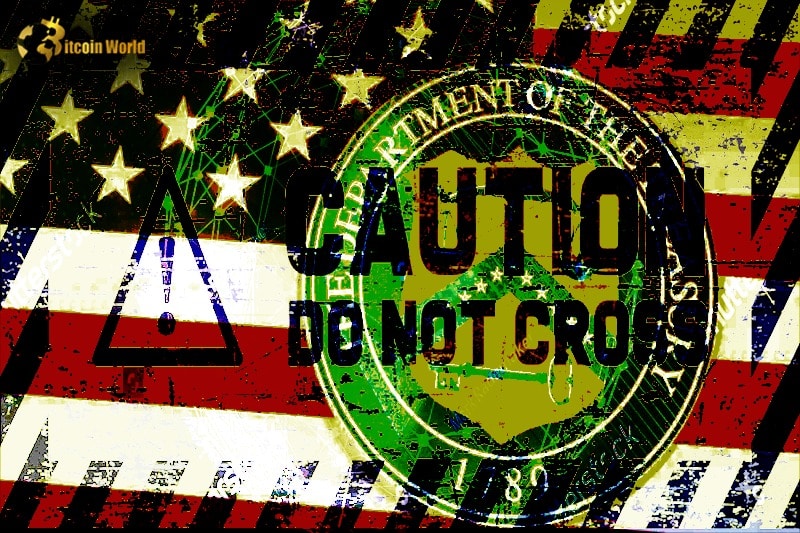In a significant move highlighting the intersection of cryptocurrency and international crime, the U.S. Treasury Department has sanctioned an Ethereum wallet allegedly connected to the notorious Sinaloa Cartel. This action by the Office of Foreign Assets Control (OFAC) marks another step in the ongoing battle against illicit fentanyl trafficking and the financial networks that enable it. But what exactly does this mean for the crypto world, and how deep is the connection between digital currencies and criminal organizations?
Ethereum Wallet Blacklisted: Unpacking the OFAC Sanctions
On September 26th, the U.S. Treasury Department announced sanctions against ten individuals, many with ties to the infamous Sinaloa Cartel. Among them was Mexican national Mario Alberto Jimenez Castro. Crucially, this sanction wasn’t just against an individual; it targeted a specific Ethereum wallet address.
Let’s break down what the Treasury Department revealed:
- Who is Mario Alberto Jimenez Castro? According to the Treasury, Jimenez Castro is a key figure reporting directly to a Chapitos deputy within the Sinaloa Cartel.
- What’s his alleged role? He is accused of operating a sophisticated money laundering operation. This operation reportedly uses virtual currency, alongside traditional methods like wire transfers, to funnel profits from illicit fentanyl sales in the U.S. back to Sinaloa Cartel leaders in Mexico.
- How does crypto fit in? The Treasury stated that Jimenez Castro directed U.S.-based couriers to collect cash from fentanyl sales within the United States. This cash was then deposited into various virtual currency wallets. These wallets were used to directly pay the Chapitos and reinvest in further fentanyl production.
The sanctioned Ethereum wallet, identified by OFAC, is 0x9c2bc757b66f24d60f016b6237f8cdd414a879fa. A quick look at Etherscan reveals some interesting details:
| Metric | Value |
|---|---|
| Wallet Balance (at time of publication) | Approximately 0.018 ETH |
| USD Value (at time of publication) | Roughly $28.22 (based on ETH price of $2,478.15 ETH $2,478.15) $2,478.15) |
| Last Activity | Over 200 days ago |
It’s worth noting the relatively small amount of Ether in the wallet and the inactivity. This could suggest various scenarios, from the wallet being primarily used for transactions that are quickly moved, to it being a smaller part of a larger network, or even a wallet that has been abandoned or compromised.
Why Target Crypto Wallets in the Fight Against Fentanyl?
The Treasury’s action underscores the growing recognition of cryptocurrency’s role in facilitating illicit activities. Why are they focusing on crypto in the context of drug cartels and fentanyl trafficking?
- Anonymity and Speed: Cryptocurrencies, while not entirely anonymous, can offer a degree of pseudonymity and faster transaction speeds compared to traditional banking systems. This can be attractive for illicit activities where speed and discretion are paramount.
- Cross-border Transactions: Crypto facilitates easier cross-border transactions, which is crucial for international crime syndicates like the Sinaloa Cartel operating between Mexico and the United States.
- Evading Traditional Financial Controls: For criminals seeking to avoid detection by banks and regulatory bodies, cryptocurrencies can present an alternative pathway for moving and laundering money.
Brian Nelson, Under Secretary of the Treasury for Terrorism and Financial Intelligence, emphasized the administration’s commitment: “Today’s actions show that Treasury and the Administration will continue to relentlessly target the criminal enterprises threatening international security and flooding our communities with fentanyl and other deadly drugs.”
A Pattern of Crypto Sanctions
This isn’t the first time OFAC has targeted cryptocurrency in its sanctions efforts. The article points to previous instances, highlighting a growing trend:
- Lazarus Group: OFAC previously sanctioned individuals connected to North Korea’s Lazarus Group, known for cybercrime and money laundering, for using crypto. sanctioning individuals with ties
- Tornado Cash: The controversial sanctioning of crypto mixer Tornado Cash in August 2022, also cited concerns about illicit finance and money laundering. adding crypto mixer Tornado Cash
- Tornado Cash Co-founder Arrest: The arrest of Tornado Cash co-founder Roman Storm in August 2023 further demonstrated the U.S. authorities’ firm stance on crypto-related financial crimes. arrested Tornado Cash co-founder Roman Storm
The Crypto Industry Pushback and Legal Challenges
The Treasury’s approach to crypto sanctions, particularly the Tornado Cash case, has faced significant backlash from the crypto industry and privacy advocates. Concerns have been raised about overreach and the potential stifling of legitimate uses of privacy-enhancing technologies.
The article mentions the lawsuit filed by Coinbase-backed individuals against the Treasury over the Tornado Cash sanctions. While a judge largely sided with the government in the initial motion, this legal battle highlights the ongoing tension between regulatory efforts to combat illicit finance and the crypto industry’s push for innovation and privacy. sided with the U.S. government
Looking Ahead: Crypto, Crime, and Regulation
The sanctioning of the Ethereum wallet linked to the Sinaloa Cartel is a clear indicator that U.S. authorities are intensifying their scrutiny of cryptocurrency’s role in facilitating criminal activities, particularly drug trafficking. This action, alongside previous sanctions and legal battles, sets the stage for continued debate and regulatory development in the crypto space.
As governments worldwide grapple with the challenges of regulating cryptocurrencies, we can expect to see:
- Increased Regulatory Focus: More stringent regulations and compliance requirements for crypto exchanges and service providers are likely to emerge.
- Technological Solutions: Development and deployment of blockchain analytics and tracing tools to identify and disrupt illicit crypto flows will become more critical.
- Ongoing Dialogue: Continued discussions and collaboration between regulators, law enforcement, and the crypto industry are essential to strike a balance between combating crime and fostering responsible innovation.
The case of the sanctioned Ethereum wallet serves as a stark reminder that while cryptocurrency offers exciting new possibilities, it also presents challenges in the fight against financial crime. The coming years will be crucial in shaping how the crypto industry and regulators navigate this complex landscape.
Disclaimer: The information provided is not trading advice, Bitcoinworld.co.in holds no liability for any investments made based on the information provided on this page. We strongly recommend independent research and/or consultation with a qualified professional before making any investment decisions.


